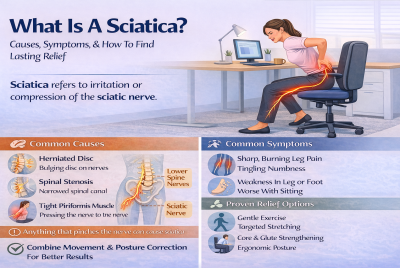Mental Health and Sciatica
Practical Advice for Coping with Both
Learn how to manage both mental health and sciatica with practical tips on self-care, relaxation, support, and holistic healing approaches. When you’re dealing with sciatica, it’s easy to focus only on the physical pain that shoots through your lower back and legs. But, as someone who has worked closely with sciatica sufferers, I’ve seen firsthand how this condition doesn’t just affect the body—it impacts the mind, too. In this article, I want to help you understand the connection between mental health and sciatica and offer practical, holistic advice for managing both.
Understanding the Connection Between Mental Health and Sciatica
How Chronic Pain Affects Mental Well-Being
Sciatica is not just about the physical discomfort. When pain lingers for days, weeks, or even months, it takes a toll on your emotional health. The constant ache can make you feel frustrated, helpless, and at times, even hopeless. Chronic pain often leads to mood swings, irritability, and fatigue, and it can drain your mental energy, leaving little room for joy or relaxation.
Stress, Anxiety, and Depression in Sciatica Patients
It’s not uncommon for sciatica patients to experience stress and anxiety over their pain. The fear of it worsening or never going away can dominate your thoughts. Depression is also a real risk when you feel like your mobility and independence are slipping away. If you’ve been battling both sciatica and mental health issues, know that you’re not alone—these two are closely linked.
The Mental and Emotional Hell of Living With Chronic Pain
Mental Health Tips for Sciatica
Here are some Mental Health Tips for Sciatica that can help support emotional balance and pain management:
🧘♀️ 1. Practice Mindfulness and Deep Breathing
Chronic pain can trigger anxiety and frustration. Mindfulness meditation and slow, deep breathing help calm your nervous system, reduce stress hormones, and make pain more manageable.
Try 5–10 minutes of guided breathing each morning.
🧠 2. Reframe Negative Thoughts
It’s easy to feel discouraged when pain limits your activities. Cognitive reframing — changing “I can’t do anything” to “I’m finding new ways to stay active” — helps prevent depression and builds resilience.
🏞️ 3. Stay Connected
Social isolation often worsens pain perception. Talk to supportive friends, join online sciatica or chronic pain communities, or consider group therapy to share experiences and encouragement.
🛌 4. Prioritize Rest and Sleep
Poor sleep increases pain sensitivity. Create a calming nighttime routine — dim lights, no screens 1 hour before bed, and use supportive pillows to reduce pressure on the lower back.
📔 5. Keep a Pain & Mood Journal
Tracking your daily pain levels, stress triggers, and mood can help you recognize patterns — like how stress or poor posture affect your symptoms — and help you discuss them more effectively with your doctor.
💬 6. Seek Professional Emotional Support
Chronic sciatica pain can lead to anxiety or depression. Cognitive Behavioral Therapy (CBT) or pain-focused counseling can teach coping strategies and reduce the emotional burden of long-term pain.
🚶 7. Gentle Movement & Relaxation
Light stretching, yoga (approved for sciatica), or short walks can release endorphins — natural mood lifters — while improving blood flow and easing stiffness.
🌿 8. Practice Self-Compassion
Healing takes time. Speak to yourself kindly, acknowledge small wins (like standing longer or sleeping better), and avoid comparing your progress to others.
The Importance of Managing Mental Health with Sciatica
Why Addressing Both Mental and Physical Health Matters
Ignoring the mental health side of sciatica can delay your recovery and make your pain feel worse. The connection between your mind and body is powerful. When you’re stressed, anxious, or depressed, your body’s ability to heal slows down. By addressing both mental and physical health, you give yourself a better shot at true healing.
The Mind-Body Connection
Have you ever noticed that when you’re anxious, your muscles tense up, and the pain in your back and legs feels sharper? That’s the mind-body connection at work. By calming your mind, you can actually reduce the tension in your body and, in turn, ease some of your pain.
Practical Tips for Coping with Mental Health and Sciatica
Prioritizing Self-Care
Taking care of yourself is crucial, both mentally and physically. Sciatica is your body’s way of telling you to slow down and listen.
The Power of Rest and Recovery
It’s tempting to push through the pain, but sometimes, rest is the best medicine. When you allow yourself to rest, you’re giving your body the time it needs to heal. Balance rest with gentle movement to avoid stiffness.
Nutrition’s Role in Mental and Physical Well-Being
What you eat matters more than you think. A diet rich in anti-inflammatory foods, like leafy greens, berries, and omega-3s, can help manage pain. Plus, eating a balanced diet boosts your mood and energy levels, making it easier to cope mentally.
Incorporating Relaxation Techniques
Breathing Exercises to Manage Stress
Simple breathing techniques can work wonders for both pain and stress. Try taking deep, slow breaths, inhaling for a count of four, holding for four, and exhaling for four. It helps calm your nervous system and takes the edge off pain.
Meditation and Mindfulness for Sciatica Relief
Mindfulness meditation is another excellent tool. By focusing on the present moment and letting go of pain-related worries, you can ease both physical tension and emotional distress.
Engaging in Physical Activity Safely
Low-Impact Exercises for Pain and Mood Improvement
Exercise releases endorphins, your body’s natural mood lifters. But with sciatica, not just any exercise will do. Low-impact activities like swimming, walking, or yoga are gentle on the body but powerful mood boosters.
The Benefits of Stretching and Gentle Movement
Stretching can reduce sciatica pain by releasing tension in the muscles around the nerve. Focus on gentle stretches that target your lower back, hips, and legs. Not only will you feel better physically, but you’ll also notice an improvement in your mental state.
Seeking Support for Mental Health While Managing Sciatica
The Role of Therapy and Counseling
Cognitive Behavioral Therapy (CBT) for Pain and Mood Management
CBT is a proven method for managing chronic pain and the negative thoughts that come with it. A therapist can help you reframe your thinking, making it easier to cope with both sciatica and the stress it causes.
Support Groups and Peer Networks for Emotional Relief
Sometimes, just talking to someone who understands what you’re going through can make all the difference. Support groups, whether in person or online, offer a safe space to share your struggles and tips for coping.
Connecting with Loved Ones
How Open Communication Helps Manage Pain and Stress
Don’t be afraid to share what you’re going through with your loved ones. When they understand your pain, both physical and emotional, they can offer the support you need to get through tough days.
The Impact of Sleep on Mental Health and Sciatica
How Poor Sleep Aggravates Both Sciatica and Mental Health
When you’re not sleeping well, your body can’t heal, and your mood takes a hit. Poor sleep makes pain feel worse and clouds your mind, making it harder to manage your emotions.
Tips for Improving Sleep Quality
Try creating a bedtime routine that encourages relaxation, like a warm bath, gentle stretches, or reading. Avoid screens before bed, and consider using a supportive pillow to ease pressure on your back while you sleep.
Medication and Mental Health in Sciatica Treatment
Pain Medications and Their Impact on Mood
While pain meds can help, some can negatively affect your mood. Opioids, for instance, can cause mood swings or even depression if used long-term. Talk to your doctor about finding a balance between managing pain and protecting your mental health.
Discussing Mental Health Concerns with Your Doctor
If you’re feeling overwhelmed, anxious, or depressed, bring it up with your healthcare provider. They can help you find the right combination of treatments for both your pain and your mental well-being.
Frequently Asked Questions (FAQs)
Can sciatica make anxiety and depression worse?
Yes, the chronic pain from sciatica can increase stress, anxiety, and depression, as the persistent discomfort can wear down your mental resilience over time.
What are some safe exercises for sciatica that can also boost my mood?
Low-impact exercises like swimming, walking, and gentle yoga are great for managing pain and improving mood by releasing endorphins.
Should I talk to a therapist if I’m struggling with sciatica?
Absolutely! Therapy, especially Cognitive Behavioral Therapy (CBT), can help you cope with the emotional toll of chronic pain and develop strategies for better managing it.
Can mindfulness really help with both sciatica and anxiety?
Yes, mindfulness practices, such as meditation and deep breathing, can help reduce both physical tension and emotional stress, making it easier to cope with pain.
How can I support a loved one dealing with both sciatica and mental health challenges?
Offer a listening ear, be patient, and encourage them to seek professional support if needed. Let them know you understand that their pain isn’t just physical—it affects their emotional well-being too.
How can I manage sleep issues caused by sciatica pain?
Improving your sleep routine, using a supportive mattress, and practicing relaxation techniques like stretching or meditation before bed can help you get better rest.
Conclusion: A Holistic Approach to Healing
Coping with sciatica can feel like an uphill battle, especially when it starts to affect your mental health. But by taking a holistic approach—addressing both mind and body—you can take control of your healing journey. Prioritize self-care, seek support, and don’t hesitate to ask for help when you need it. Remember, it’s okay to focus on your mental health as much as your physical health—both are essential parts of your recovery.
Disclaimer
Please note that this article should not replace professional medical advice. Consult a healthcare professional for an accurate diagnosis and tailored treatment plan.






